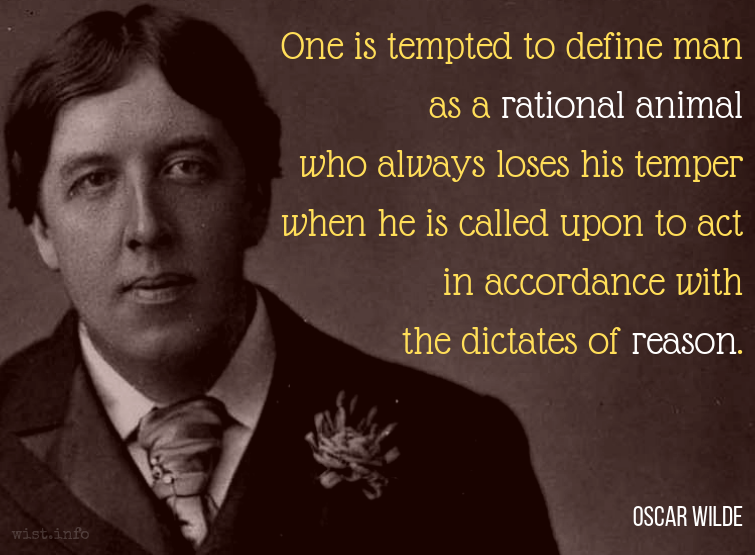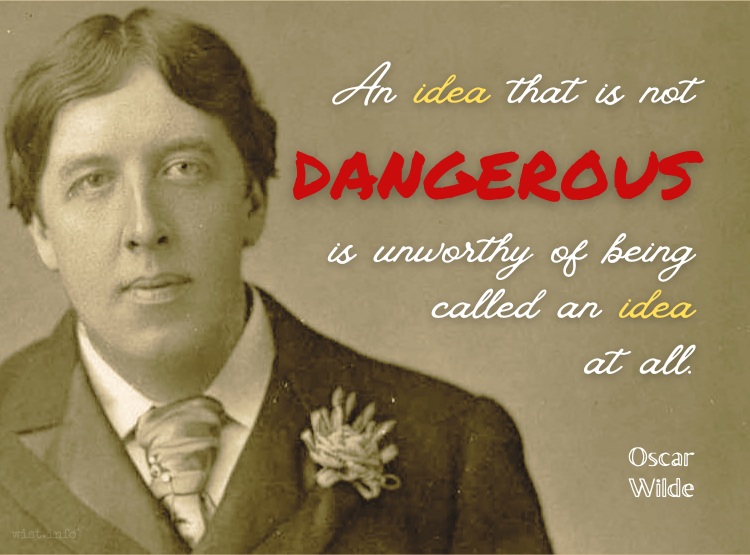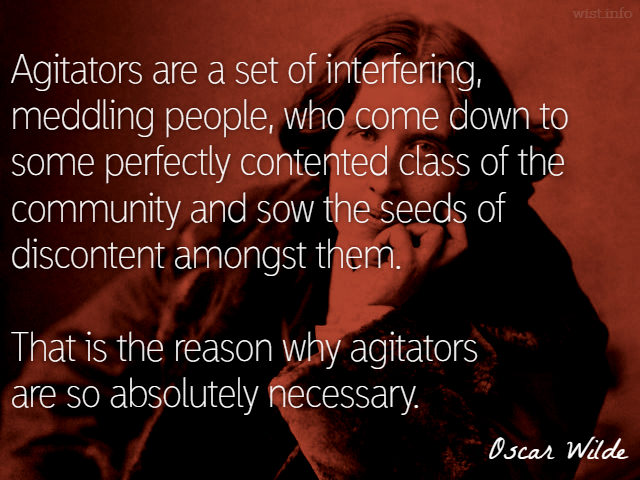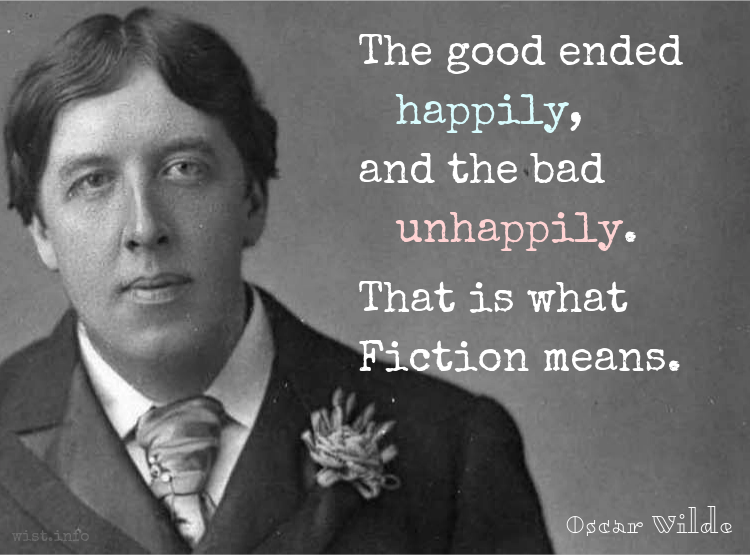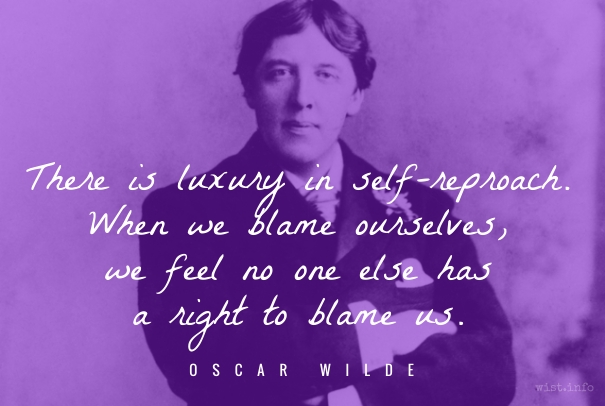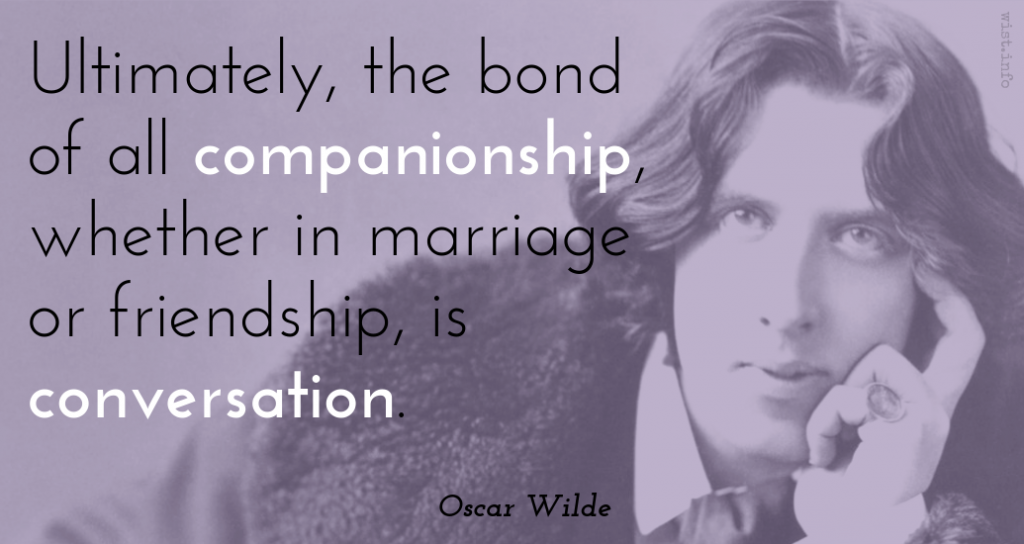And, after all, what is a fashion? From the artistic point of view, it is usually a form of ugliness so intolerable that we have to alter it every six months.
Oscar Wilde (1854-1900) Irish poet, wit, dramatist
“Literary and Other Notes — I,” Woman’s World (Nov 1887)
Full text.
Quotations by:
Wilde, Oscar
The security of society lies in custom and unconscious instinct, and the basis of the stability of society, as a healthy organism, is the complete absence of any intelligence amongst its members. The great majority of people being aware of this, rank themselves naturally on the side of that splendid system that elevates them to the dignity of machines, and rage so wildly against the intrusion of the intellectual faculty into any question that concerns life, that one is tempted to define man as a rational animal who always loses his temper when he is called upon to act in accordance with the dictates of reason.
Oscar Wilde (1854-1900) Irish poet, wit, dramatist
“The Critic as Artist,” Intentions (1891)
(Source)
An idea that is not dangerous is unworthy of being called an idea at all.
Oscar Wilde (1854-1900) Irish poet, wit, dramatist
“The Critic as Artist,” Part 2 [Gilbert], Intentions (1891)
(Source)
Man is least himself when he talks in his own person. Give him a mask, and he will tell you the truth.
If you cannot enjoy reading a book over and over again, there is no use reading it at all.
There are three kinds of despots. There is the despot who tyrannizes over the body. There is the despot who tyrannizes over the soul. There is the despot who tyrannizes over the soul and body alike. The first is called the Prince. The second is called the Pope. The third is called the People.
What is said by great employers of labor against agitators is unquestionably true. Agitators are a set of interfering, meddling people, who come down to some perfectly contented class of the community and sow the seeds of discontent amongst them. That is the reason why agitators are so absolutely necessary. Without them, in our incomplete state, there would be no advance towards civilization.
Oscar Wilde (1854-1900) Irish poet, wit, dramatist
“The Soul of Man Under Socialism” (1891)
(Source)
Simple pleasures are the last refuge of the complex.
WILDE: I wish I had said that.
WHISTLER: You will, Oscar, you will.Oscar Wilde (1854-1900) Irish poet, wit, dramatist
(Attributed)
An anecdotal exchange between Wilde and James Whistler, associated with how Wilde was known for reusing epigrams and witticisms from various folk, usually not crediting them.
References to the exchange date back, in various sources and forms, as far as 1886, with the specific language varying, and the original bon mot from (usually) Whistler not mentioned. More details and discussion: “I Wish I Had Said That” “You Will, Oscar, You Will” – Quote Investigator®.
Consistency is the last refuge of the unimaginative.
I sometimes think that God in creating man, somewhat over-estimated his ability.
Oscar Wilde (1854-1900) Irish poet, wit, dramatist
(Attributed)
(Source)
The quotation first appears, without much citation, in Francis Douglas, Oscar Wilde and the Black Douglas, ch. 2 (1940), four decades after Wilde's death. Further discussion of the quotation here: God In Creating Man, Somewhat Overestimated His Ability – Quote Investigator
I have the simplest tastes. I am always satisfied with the best.
Oscar Wilde (1854-1900) Irish poet, wit, dramatist
(Attributed)
(Source)
Quoted in Edgar Saltus, Oscar Wilde: An Idler's Impression (1917), as a comment made to him by Wilde.
Also attributed to Winston Churchill, with less foundation.
For more discussion about this quotation: I Have the Simplest Tastes; I Am Always Satisfied with the Best – Quote Investigator.
It is absurd to divide people into good and bad. People are either charming or tedious.
Oscar Wilde (1854-1900) Irish poet, wit, dramatist
Lady Windemere’s Fan, Act 1 [Lord Darlington] (1892)
(Source)
I can resist everything except temptation.
Oscar Wilde (1854-1900) Irish poet, wit, dramatist
Lady Windermere’s Fan, Act 1 [Lord Darlington] (1893)
(Source)
Also attributed to Mark Twain, Mae West, and W. C. Fields. The sentiment may not be original to Wilde, but his use popularized it.
CECIL GRAHAM: What is a cynic?
LORD DARLINGTON: A man who knows the price of everything and the value of nothing.
In this world there are only two tragedies. One is not getting what one wants, and the other is getting it.
Oscar Wilde (1854-1900) Irish poet, wit, dramatist
Lady Windermere’s Fan, Act 3 [Dumby] (1892)
(Source)
More discussion of this quote: There Are Only Two Tragedies. One Is Not Getting What One Wants, and the Other Is Getting It – Quote Investigator.
Experience is the name every one gives to their mistakes.
Oscar Wilde (1854-1900) Irish poet, wit, dramatist
Lady Windermere’s Fan, Act 3 [Mr. Dumby] (1892)
(Source)
Also in Wilde's The Picture of Dorian Gray, ch. 4 (1890):Experience was of no ethical value. It was merely the name men gave to their mistakes.
Indeed, in many respects, she was quite English, and was an excellent example of the fact that we have really everything in common with America nowadays, except, of course, language.
Death must be so beautiful. To lie in the soft brown earth, with the grasses waving above one’s head, and listen to silence. To have no yesterday, and no to-morrow. To forget time, to forget life, to be at peace.
Oscar Wilde (1854-1900) Irish poet, wit, dramatist
The Canterville Ghost, ch. 5 [The Ghost] (1887)
(Source)
GWENDOLYN: On an occasion of this kind it becomes more than a moral duty to speak one’s mind. It becomes a pleasure.
Oscar Wilde (1854-1900) Irish poet, wit, dramatist
The Importance of Being Earnest, Act 2 (1895)
(Source)
The good ended happily, and the bad unhappily. That is what Fiction means.
Oscar Wilde (1854-1900) Irish poet, wit, dramatist
The Importance of Being Earnest, act 2 (Miss Prism) [1895]
(Source)
LADY BRACKNELL: I dislike arguments of any kind. They are always vulgar, and often convincing.
Oscar Wilde (1854-1900) Irish poet, wit, dramatist
The Importance of Being Ernest, Act 3 (1895)
(Source)
All that [experience] really demonstrated was that our future would be the same as our past, and that the sin we had done once, and with loathing, we would do many times, and with joy.
Oscar Wilde (1854-1900) Irish poet, wit, dramatist
The Picture of Dorian Gray, ch. 4 (1891)
(Source)
The passage also occurs in ch. 3 of the original Lippincott's Monthly Magazine (1890-06) version.
As extracted into Oscariana and epigram form (e.g.), it is given in the present tense:All that it really demonstrates is that our future will be the same as our past, and that the sin we have done once, and with loathing, we shall do many times, and with joy.
There is luxury in self-reproach. When we blame ourselves, we feel no one else has a right to blame us. It is the confession, not the priest, that gives us absolution.
Oscar Wilde (1854-1900) Irish poet, wit, dramatist
The Picture of Dorian Gray, ch. 8 (1891)
(Source)
Nothing makes one so vain as being told that one is a sinner. Conscience makes egotists of us all.
Oscar Wilde (1854-1900) Irish poet, wit, dramatist
The Picture of Dorian Gray, ch. 8 [Lord Henry] (1891)
(Source)
Life is much too important a thing ever to talk seriously about it.
Oscar Wilde (1854-1900) Irish poet, wit, dramatist
Vera; or, The Nihilists, Act 2 [Prince Paul] (1881)
(Source)
Almost always paraphrased, "Life is too important to be taken seriously."
In Lady Windermere's Fan, Act 2 (1892), he recycled the line as "Life is far too important a thing ever to talk seriously about it."
Also (mis)attributed to G.K. Chesterton. More discussion of this quotation: Life Is Too Important To Be Taken Seriously – Quote Investigator.
No object is so ugly that, under certain conditions of light and shade, or proximity to other things, it will not look beautiful; no object is so beautiful that, under certain conditions, it will not look ugly.
Oscar Wilde (1854-1900) Irish poet, wit, dramatist
Lecture to Art Students, Royal Academy, London (30 Jun 1883)
(Source)
Ultimately, the bond of all companionship, whether in marriage or friendship, is conversation.
Oscar Wilde (1854-1900) Irish poet, wit, dramatist
Letter (1897-03) to Alfred Douglas, “Epistola: In Carcere et Vinculis”
(Source)
Wilde titled the letter, written while in prison in Reading, England, Epistola: In Carcere et Vinculis ("Letter: In Prison and in Chains"). Upon his release, the letter was entrusted to Robert Ross, who in 1905, after Wilde's death, published an edited version under the title De Profundis ("From the Depths," from Psalm 130), and later editions have retained that name.
This quotation was not in the 1905 edition, but in the eventually fully-restored version in Wilde's complete letters.
More information on the history of the letter here.
After all, the only proper intoxication is conversation.


